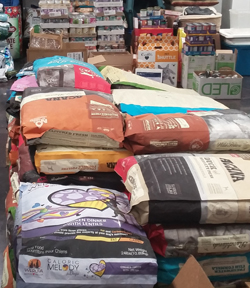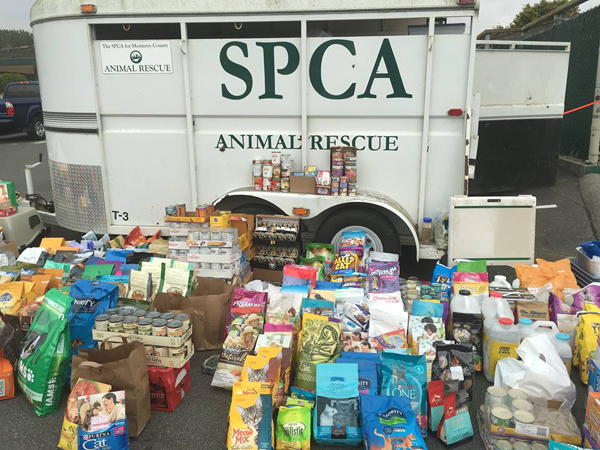For most people, the holiday season is one long buffet table spreading from Thanksgiving though Christmas. But for many, and for their pets, the cupboard is often bare. If you’re homeless, living below the poverty level, or on a fixed income, affording a pet any time of the year can be challenging. Fortunately, there’s help available for these pet owners. Here’s how pet food banks work for families in need.
On a recent Sunday night, just as temperatures were starting to drop, the Puget Sound Pet Food Bank got a message on their Facebook page that could not be ignored. A homeless woman living in a cold garage was worried about her Chihuahua mix and asked if they might have any coats.
“We had to help her,” board member Judy Grover said. Fortunately, they’d just had a donation of dog coats and were able to provide their new client with both food and a warm jacket for her dog.
The food bank, started in 2013, has already grown to two locations with a third soon to open. They are now distributing approximately 2,500 pounds of dog and cat kibble, and 650 cans of canned food each month to families who might otherwise be forced to relinquish their pets.
Though some people-oriented food banks also have pet food, pet-specific pantries are expanding all over the country, from local, individual efforts to national campaigns. Below are some of the groups who need support as they work at keeping pets and families together by taking worries about food bills off the table.
A local organization grows
Ann King started the Save Our Pets Food Bank in Atlanta in 2008 in response to reports that owners were giving up pets because they could no longer afford food. Since then it has grown far beyond the region and helped 300 pet food banks get started across the country. Their website includes a directory of unaffiliated pet food assistant programs across the country.
Phone: 404-971-1913
Email: info@saveourpetsfoodbank.org
Bringing food companies and non-profits together
When a pet food manufacturer’s products are reaching their best but date, or have packaging defects, Rescue Bank steps in. This GreaterGood.org program takes quality donations from pet food companies and delivers them to vetted non-profits in communities across the country. Their donations feed needy animals and allow local rescue organizations to spend scarce funds on other needs. Grab a box of tissues and meet some of the pets who have benefited in the video below.
Phone: 800 765-6920
Email: info@rescuebank.org | Phone: 800 765-6920
Reaching out through religious organizations
This program through The Humane Society of the Unites States works to connect churches with local animal shelters. Organizations can fill out a form on the HSUS site and receive a kit containing bin stickers, a poster and postcards to help get the word out and drum up food donations. Not a churchgoer? Contact your local Humane Society to find a pet food bank near you.
Phone: 202-452-1100
Email: donorcare@humanesociety.org.
Bringing pet food to those in need
According to Meals on Wheels, seniors with pets are 35% less likely to report being lonely and make 21% fewer doctor visits than those without animals. However, pets are difficult to pay for on a fixed income, and being home bound only adds to the struggle. The organization that delivers food to so many seniors also supports programs across the country working to keep pets and elderly owners together. The Meals on Wheels Loves Pets Program has awarded more than $1.8 million to 300 local programs across the country, helping more that 22,000 pets. In 2015, Meals on Wheels America took over the program. To donate or for more information contact them via email or by phone. To find a local Meals on Wheels agency in your area input your zip code with their online tool.
Phone: 888-998-6325
Email: pets@mealsonwheelsamerica.org.
How the SPCA fills food bowls
The Society for the Prevention of Cruelty to Animals has members from New York to California have pet food banks in need of help. Contact your local SPCA to see if they operate a food bank in your area. These are just the tip of the iceberg.
Alaska SPCA
Phone: 907-562-1092
Email: thriftshop.spca@alaska.net
Central New York SPCA
Phone: 315-454-4479
Email: mail@cnyspca.org
SPCA of Monterey County
Phone: 877-477-2262
Email: info@spamc.org
Start your own pet food drive
Best Friends is a non-profit dedicated to the dream of “No More Homeless Pets” and runs the largest no-kill sanctuary for companion animals in the country. It’s no surprise they have some pretty good ideas about food banks. Best Friends knows that economic adversity leads to more abandoned pets, and they have a food drive action plan for those who want to help. If you’re ready to do more than donate, their detailed advice guides you through the steps of planning and organizing your own pet food drive, from finding a local pantry to getting the word out, to rounding up volunteers.
Phone: 435-644-2001
Email: info@bestfriends.org





